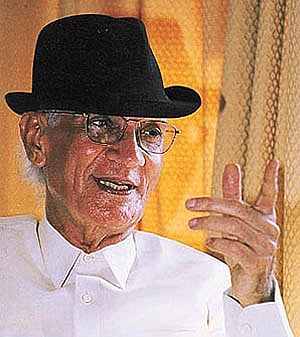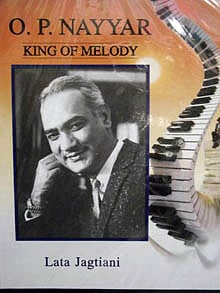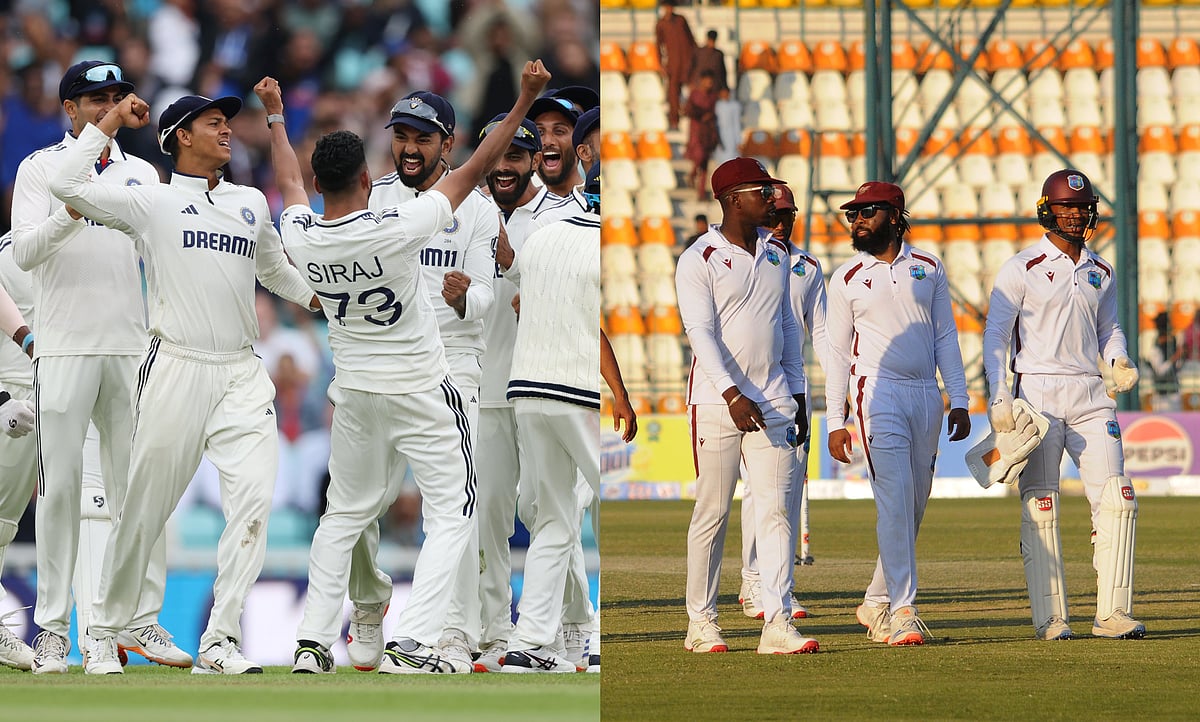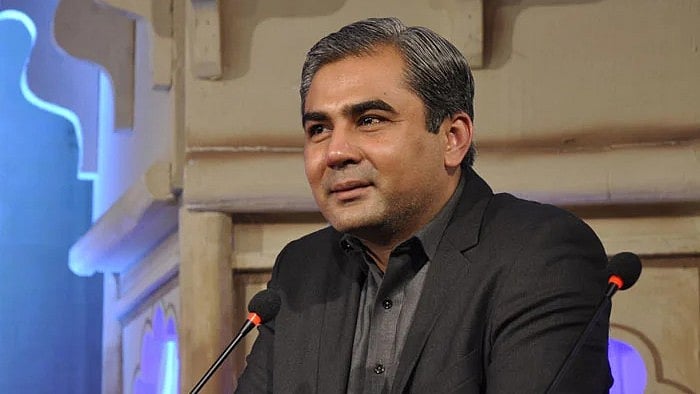How does one assess the work of an individual, be he a lawyer, doctor, scientist, sportsman or films star – or a music composer like O.P. Nayyar? By the sheer weight of his contribution to society at large? By the very nature of his character? By his professional attainment?

There is no doubt that as a composer, with no formal training in music, OP is incomparable. The author of this superb biography describes him as King of Melody. Practically every one of the seventeen friends, singers and fans who have provided their own assessment of Onkar Prasad’s (OP’s) work have nothing but superlatives to express their feelings.
He was born on January 16, 1926 in Lahore and passes away in an obscure home in Thane, a Mumbai suburb on January 28, 2007 and in those 81 years he literally made cinematic musical history. It is difficult to believe that by the time he was hardly 12, he was both acting and singing! According to an earlier biographer, Vishwas Nerurkar, OP was composing songs for All India Radio when he was still in his teens!

O.P. Nayyar: King of Melodies
Lata Jagtiani
Jharna Books
Pages: 404; Price: Rs 800 |
At 17 he composed and recorded Sant Kabir’s Kabirvani for His Master’s voice. Partition of India in 1947 brought an unwilling OP to India. By then he had already become a composer and was to composer the music for two songs written by Saroj Mohini, his wife-to-be. Both were sung by C.H Atma who had a voice resembling that of K.L. Saigal.
Atma had mesmerised Producer Pancholi and credit is given to Pancholi and Atma for getting OP to come to Bombay where, as they say, he awakened the world to his music. The two songs are too well-known, one ‘Preetam aan milo’ and the other ‘Kaun nagar tere kaun thikaana’. To read Jagtianiis to be captivated by OP’s indisputable genius.
Sadly, even while he made his remarkable journey into greatness to be a legend in his own right, he messed up his life as he did others only to pay for it heavily. He literally composed hundreds of songs and they were sung by he likes of Mohammad Rafi, Asha Bhonsale, Penaz Masani, Geeta Dutt and Kishore Kumar.
In all OP composed music for 79 films but is ‘Preetam aan milo’ was a good starter, his contribution to ‘Aar Paar’ truly set him going. It was, as Jagtiani puts it, “a game changer” in OP’s life, after which there was no looking back. Producers did not hesitate to pay him whatever he demanded. He once told Jagtiani: “Beta, any music is me!”
Women inspired him. He told here: “I am nothing without a woman.” A significant statement. His friends have so much to say about him by way of tribute that is truly inspiring. According to Ruhan Kapoor “Nayyarsaab was a tiger-man in the real sense, fearless and tactful.”
A fan, Malini Iyer in her contribution to this book says: “For a person who was never formally trained in classical music it is mind-boggling how he has composed songs which would make people think that he was proficient in classical music.” According to another fan, a distinguished scholar and TV reviewer, Vina Leekha, “words are quite simply inadequate when it comes to describing the magic of the OP effect”. According to yet another fan, Naveen Anand “OPN was a winner all the way to heaven”.
OP set his own rules. He would say that he was ‘god-gifted’ which surely he most certainly was. He would give credit to the singers. As he once said: “Unsung and unplayed, the composition us like a beautiful statue or painting inert static, until the singer with his or her voice breathes life into it, imbues it with feeling and expression…”
One of his closest associates, Mohammad Rafi, sang more than 200 songs for OP, even if Asha Bhonsale beat him with 320 plus. Actually out of OP’s 77 released films, Rafi sang a whopping 203 in 57 films.
But what sort of man was OP? One assessment is that he was “a holy terror, a staunch believer in God and a committed Krishna devotee (bhakt)”, punctual to a fault that frightened many who worked with him. Lata Mangeshkar once kept him waiting; she was made to pay for it by being ignored thereafter. He was, as Jagtiani notes “intelligent, sensitive” and knew how to make “women miss a heart-beat”.
At the same time he was terribly self-centred, demanding more from others than he himself was willing to give, always suspicious of the women he lived with, “a lone wolf, a thinker and a philosopher” who never pretended to be anything more than what he was. Jagtiani quotes him as saying: “Before I married, I told my wife that I would always remain a womaniser…My life was fast, whiskey and women were a compulsory part of the day” – and honest but shocking thing to say.
The great music historian, Manek Premchand in describing OP says that while “OP will be remembered for his ghoda-gaadi songs” one has only to look at the cornucopia of classical, enjoyable songs” OP had left behind. And to that Manek adds: “They don’t make them like him anymore.”
A womaniser and a bohemian with a taste for the best of whiskey, with a wife still alive and two daughters to boot and OP couldn’t care less what anyone thought of him. His family finally decided that it couldn’t take his life style any longer and later in his life time when he was slowly going downhill, he had to leave his family behind him and start life afresh, though some friends were willing to take him under their wing.
He had his way with women like Asha Bhonsale, Geeta Dutt, Madhuri Joglekar whom he deserted and who, Asha especially, had literally given their life to him. He left them emotionally shattered. What is shocking is that he had the impertinence to say in a TV interview that he “didn’t regret Asha”. It is all very well to say as Jagtiani puts it, that OP’s “sheer magnetism made women swoon” and he was “deadly, an absolute heart-breaker”.
Again, it is no argument to say, as Jagtiani has pointed out that there are so many in the film world who are “scarcely perfect” though their professional work left one “awe struck”. Does that make OP’s behaviour acceptable? Jagtiani says that her book – which is more than a biography and is closer to an encyclopaedia – is a tribute to a man who showed her “more heaven than any other composer ever would”. A great tribute indeed.
Jagtiani debunks the myth that OP was a mere ghoda-gaadi rhythm composer. Her deep and profound study includes the roles of actors who lip-synched Nayyarana songs, the interments used in melodies sung, the themes he articulated – and this is where her research attains dazzling proportions.
It is the ultimate tribute to a man who, according to the author-composer “was neither a saint nor a sinner” and was just O.P. Nayyar.
M V KAMATH










